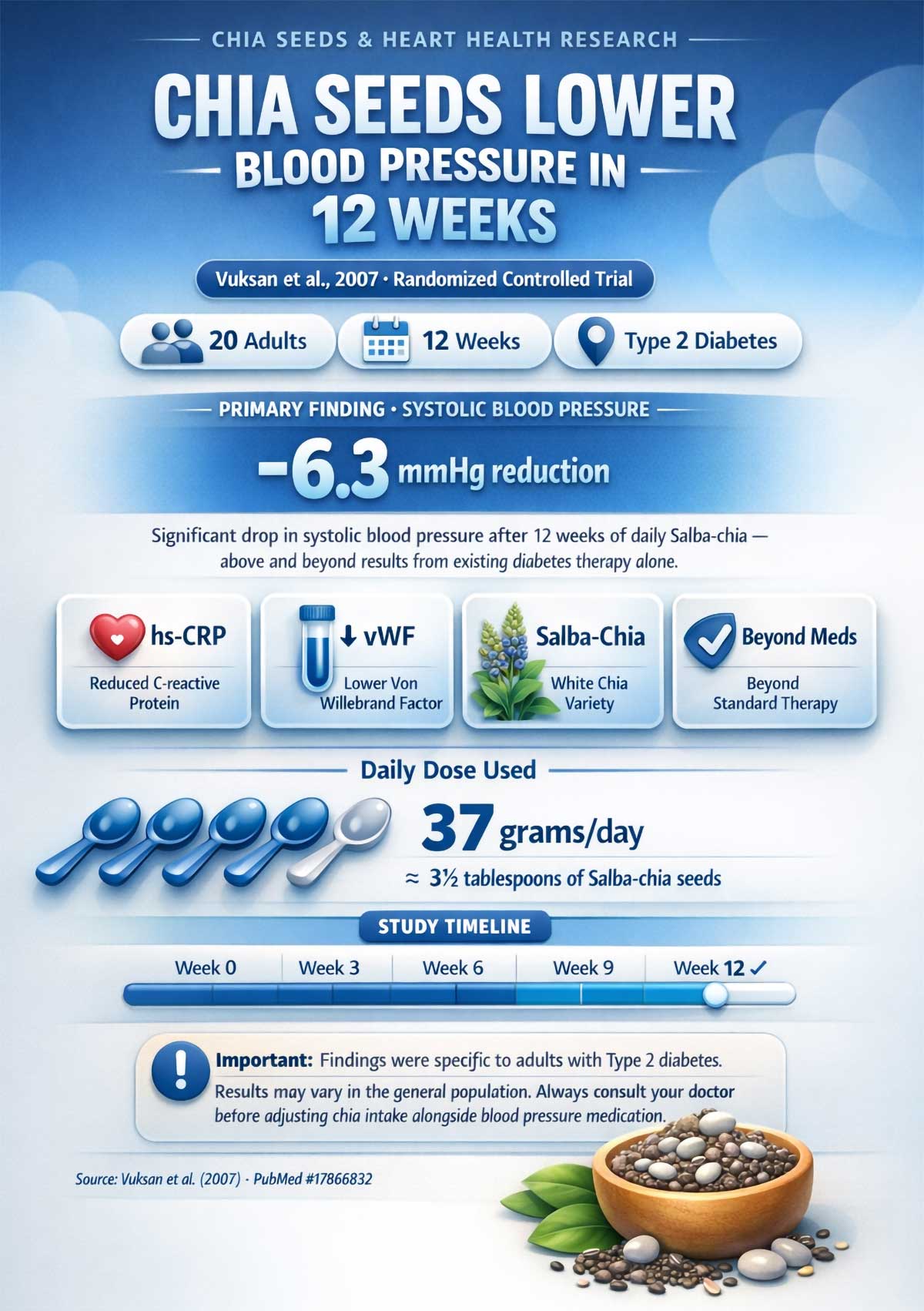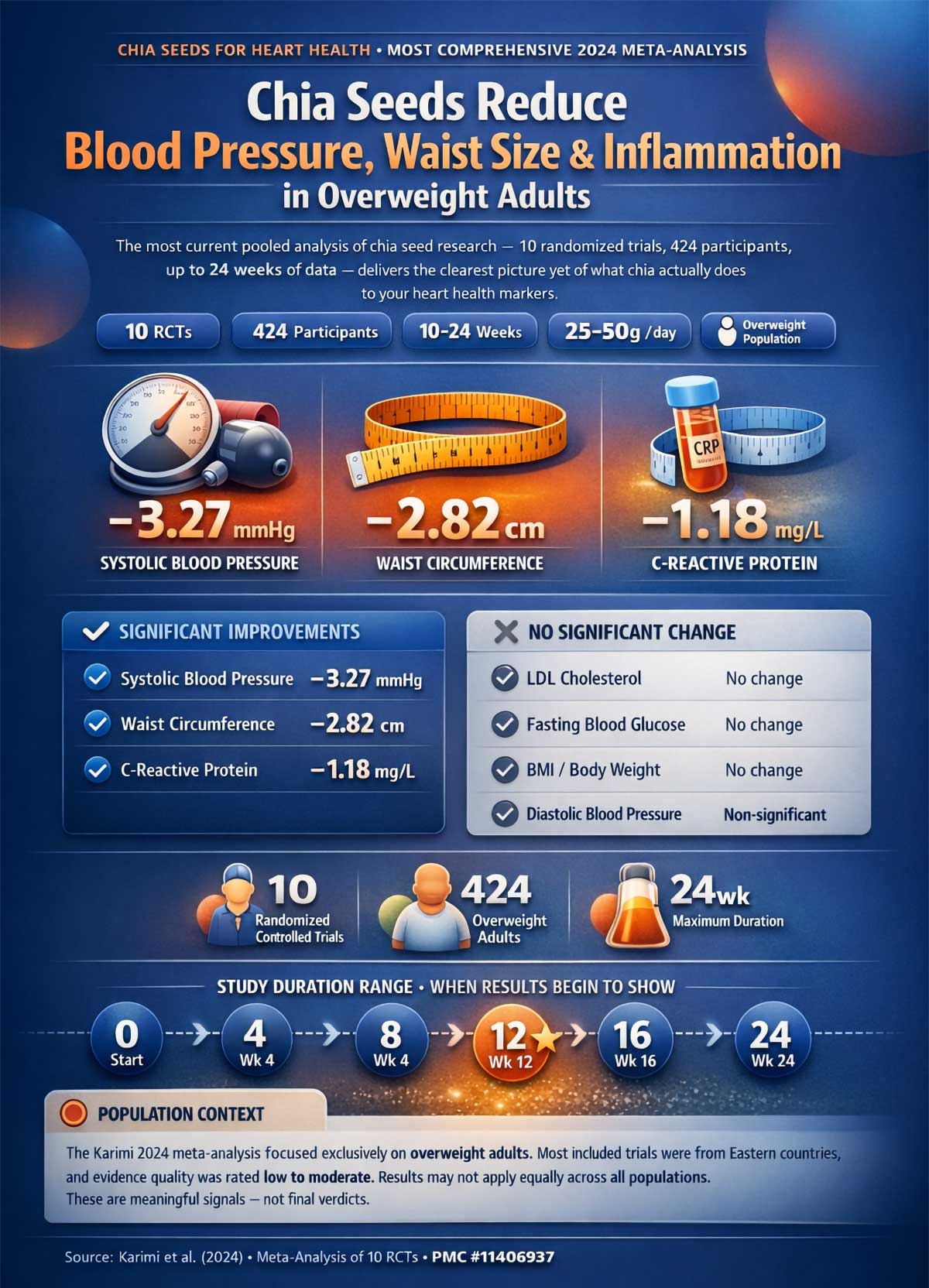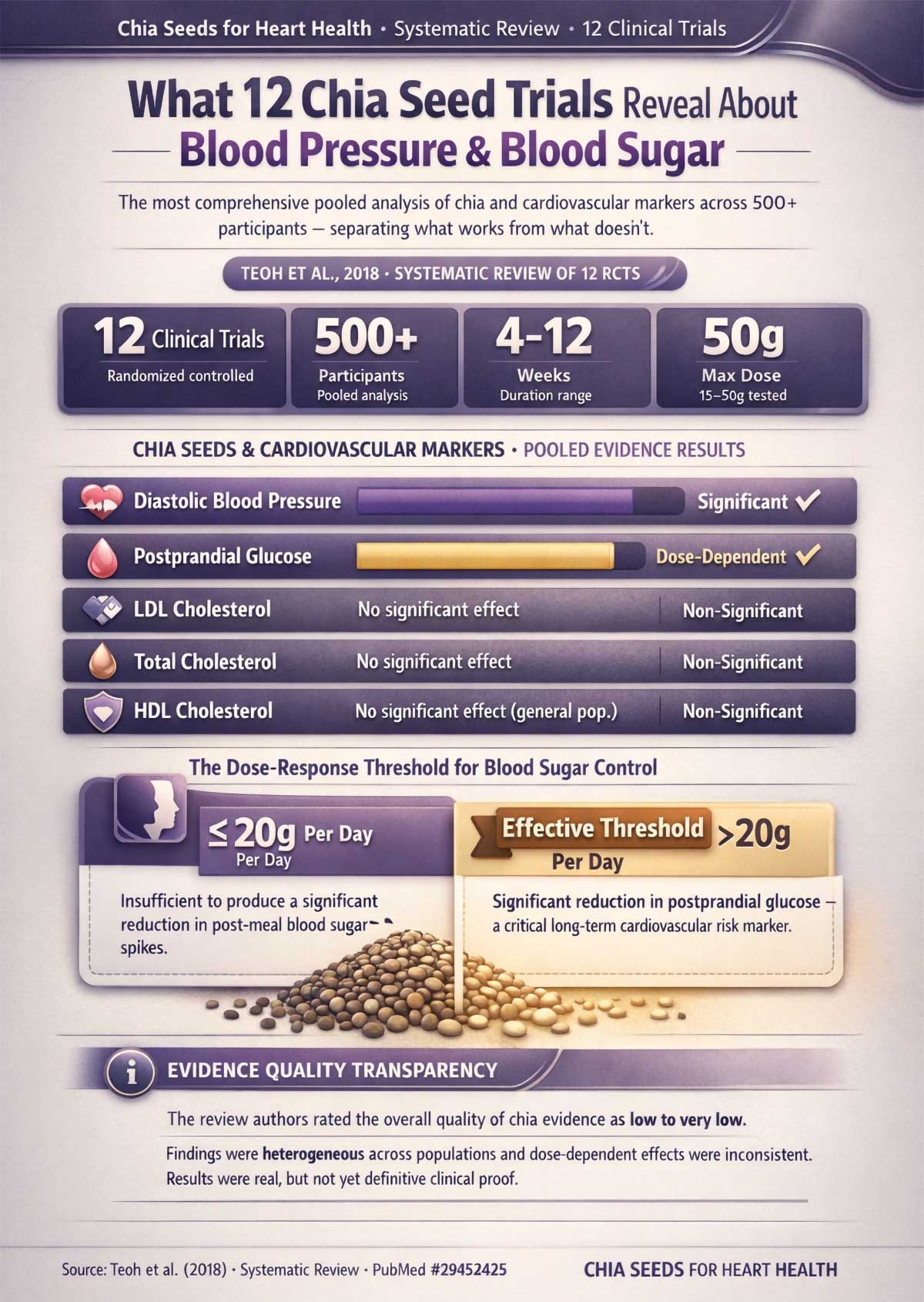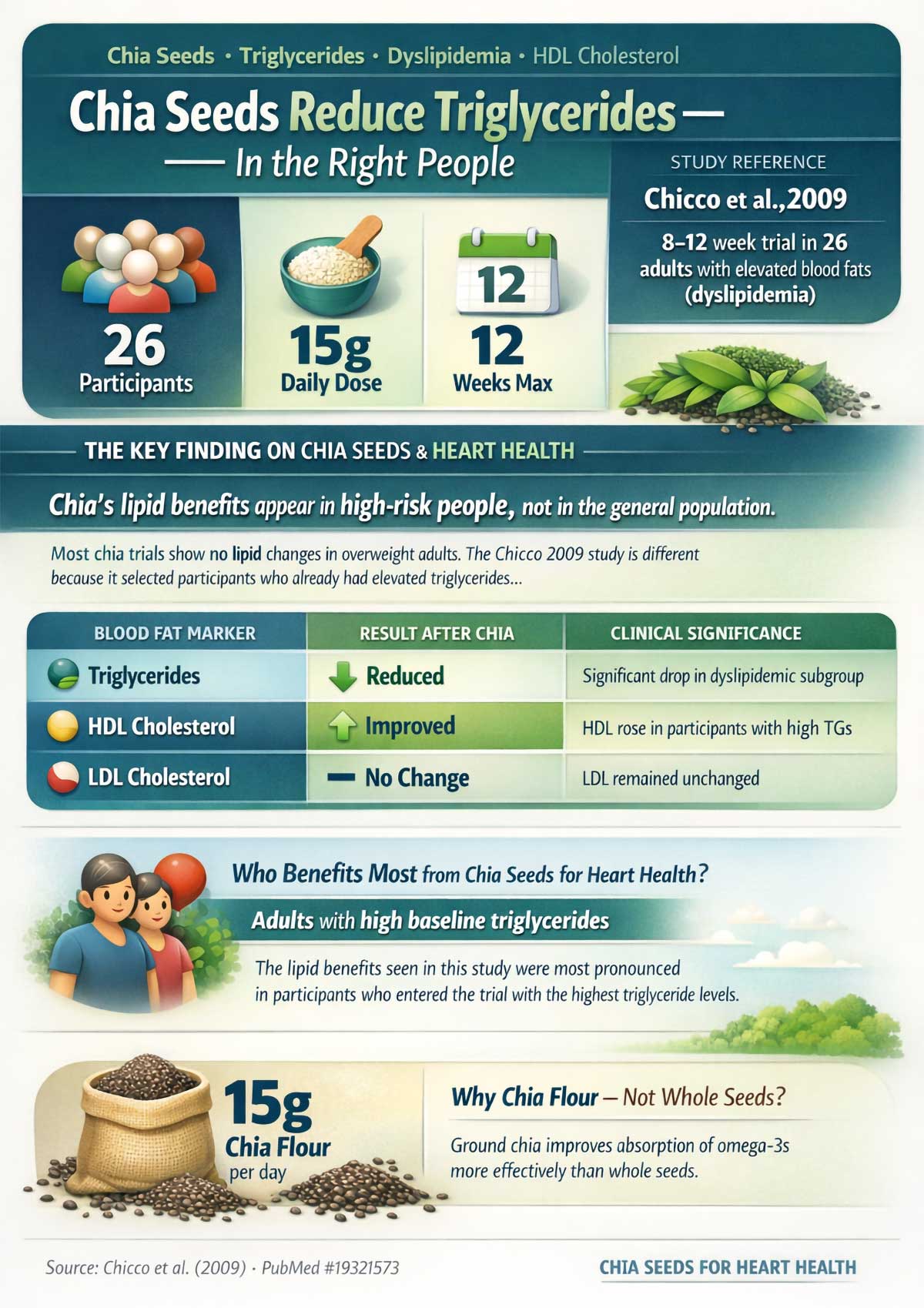Chia seeds do offer real cardiovascular benefits. But they work better for some things than others. And the dose and timeline matter more than most people realize. Here’s what the clinical research actually shows.
The 12-Week Benchmark: Why Time Matters
Nutrition studies don’t show results overnight. Most researchers use a 12-week window — roughly 84 days — to measure meaningful changes in heart health markers. That’s because the body needs time to respond to dietary shifts. Blood pressure, inflammation levels, and metabolic markers all require weeks of consistent intake to show a measurable shift.
This 12-week mark appears again and again across chia seed research. It’s the timeline used in the most cited trials, and it’s where the clearest findings emerge. If you’re eating chia for a few days and expecting results, the science says otherwise.
One honest note worth making upfront: most chia seed studies are small to medium in size. According to systematic reviews, the overall quality of evidence ranges from low to moderate. The findings are real, but not yet at the level of definitive proof. That context matters as you read what follows.
Blood Pressure: Where Chia Seeds Shine Brightest
The most consistent finding across chia seed trials is a reduction in systolic blood pressure — the top number in a blood pressure reading.
In a landmark trial by Vuksan and colleagues in 2007, 20 patients with type 2 diabetes took 37 grams of Salba-chia daily for 12 weeks. Systolic blood pressure dropped by an average of 6.3 mmHg compared to the placebo group. Researchers also noted significant reductions in emerging cardiovascular risk markers, including high-sensitivity C-reactive protein (hs-CRP) and von Willebrand factor — a protein linked to blood clotting risk. These results came on top of what participants were already achieving through their existing diabetes therapy.

That’s a meaningful drop. For context, a 5 mmHg reduction in systolic blood pressure is associated with lower stroke and heart attack risk at a population level.
It’s also worth knowing that nine of the twenty participants in that trial were already taking blood pressure medication. If you’re in that situation, chia’s additional 3 to 6 mmHg reduction could be meaningful — but talk to your doctor before significantly increasing your chia intake. The combined effect may require a medication adjustment.
The 2024 meta-analysis by Karimi and colleagues confirmed the blood pressure trend at a larger scale. This analysis focused on overweight adults rather than diabetic patients. Across 10 randomized controlled trials with 424 overweight participants, pooled data showed a statistically significant reduction in systolic blood pressure of 3.27 mmHg. This wasn’t a single outlier — it was a consistent pattern across multiple well-controlled trials.

The Salba-Chia Factor
Several of the strongest blood pressure findings came from trials using a specific white chia variety called Salba-chia, studied for its consistent omega-3 fatty acid content. The good news: standard brown and black chia seeds have comparable omega-3 levels and should offer similar benefits. You don’t need to hunt for a specialty product. Consistency of dose matters far more than variety.
For someone managing high blood pressure, chia seeds at the right dose may serve as a useful nutritional addition alongside medical treatment — not a replacement for it.
Inflammation: A Quieter Win
Chronic low-grade inflammation plays a central role in heart disease. C-reactive protein, or CRP, is one of the most widely used blood markers to track it. When CRP levels are elevated, it signals inflammation in the arteries — a key step in the plaque buildup that leads to heart attacks.
The 2024 Karimi meta-analysis found a significant reduction in CRP of 1.18 mg/L in overweight participants who consumed chia seeds over 10 to 24 weeks. That’s a real, measurable drop in arterial inflammation — and one of the stronger arguments for chia as a heart-health food.
This anti-inflammatory effect likely comes from chia’s high content of alpha-linolenic acid (ALA), a plant-based omega-3 fatty acid. Omega-3s reduce the production of pro-inflammatory signaling molecules in the body. Chia seeds are one of the richest plant sources of ALA available, with roughly 5 grams per tablespoon.
The Cholesterol Question: Setting Honest Expectations
Here’s where the narrative gets more complicated — and where most health articles fall short.
Many people turn to chia seeds hoping to lower their LDL (“bad”) cholesterol or total cholesterol. The evidence does not support this expectation in most people.
The 2009 trials by Nieman and colleagues tested 50 grams of chia per day in overweight men and women over 12 weeks. Despite the high dose, neither the male nor the female cohort showed significant changes in LDL cholesterol, total cholesterol, or body weight. These were well-designed trials, and the null findings on lipids were clear.
The broader 2018 systematic review by Teoh and colleagues analyzed 12 randomized controlled trials with over 500 participants and reached a similar conclusion. Pooled analysis showed no significant effects on the main lipid parameters — LDL, total cholesterol, or HDL — across the general adult population.

The Triglyceride Exception
There is one important nuance here. A 2009 study by Chicco and colleagues tested 15 grams of chia flour per day in 26 people with elevated blood fats, a condition called dyslipidemia. In this specific group — people who already had high triglyceride levels — chia consumption reduced triglycerides and improved HDL (“good”) cholesterol. LDL remained unchanged, as in other trials.

This suggests chia may offer lipid benefits specifically for people with existing triglyceride problems, rather than across the board. For the average person with normal cholesterol levels, expecting chia to significantly shift their lipid panel after 12 weeks isn’t well-supported by the evidence.
The takeaway: chia seeds are a blood pressure and inflammation tool, not a cholesterol-lowering one. Both things can be true — and being clear about the difference is what separates accurate nutrition information from wishful thinking.
Waist Size and Blood Sugar: Two More Areas Worth Watching
Waist Circumference
Even when body weight didn’t change in clinical trials, waist circumference sometimes did. The Karimi 2024 meta-analysis found a significant reduction of 2.82 cm in waist circumference among overweight participants consuming chia seeds over 10 to 24 weeks. This matters because abdominal fat is more closely linked to cardiovascular risk than total body weight.
A follow-up trial by Vuksan and colleagues in 2010 tested 30 grams of Salba-chia daily in 58 people with type 2 diabetes. When chia was added to a structured dietary program, participants showed meaningful improvements in waist circumference alongside blood pressure reductions. The researchers concluded that chia’s benefits were most apparent when paired with broader dietary effort — not when used in isolation.
Postprandial Blood Sugar
The 2018 systematic review by Teoh and colleagues highlighted another specific finding: chia seeds helped reduce the blood sugar surge that follows a meal — what researchers call the postprandial glucose response. This effect was dose-dependent, requiring more than 20 grams per day to produce a significant result.
This connection to heart health is direct. Repeated blood sugar spikes after meals contribute to chronic inflammation in the arteries, accelerate arterial damage, and drive insulin resistance over time. Stabilizing those spikes is one of the quieter ways chia may protect the cardiovascular system long-term — and it ties neatly back to the same anti-inflammatory benefits discussed earlier.
How Much Do You Actually Need?
This is the question most articles skip. And it’s the most practical one.
The research tells a clear story on dose. Lower amounts — around 15 grams per day — show limited effects in most populations, though the Chicco dyslipidemia study shows exceptions for high-risk groups. The most consistent heart-health benefits appear at 30 to 50 grams per day, sustained for at least 12 weeks.
Thirty grams is roughly three tablespoons. That’s a meaningful amount to fit into a daily routine, but it’s entirely doable with a bit of planning.
One important caveat: moving to 30 grams of chia per day is a significant jump in fiber intake. Chia seeds contain about 10 grams of fiber per tablespoon. Going from zero to 30 grams overnight can cause real digestive discomfort — bloating, gas, or loose stools. A gradual ramp-up over two to three weeks gives the gut time to adjust and makes the habit far easier to sustain.
3 Research-Backed Ways to Hit Your Daily Dose
Soak or Grind First
Whole dry chia seeds pass through the digestive system partly undigested. Studies comparing chia flour to whole seeds suggest that grinding or soaking improves nutrient absorption. When soaked in liquid, chia seeds form a gel that also slows glucose absorption — which ties directly to the postprandial blood sugar benefits seen in the Teoh review. Aim to soak your chia for at least 20 minutes before eating.
Build It Into Breakfast
The postprandial glucose data points to meals as the key window for chia’s benefits. Adding 30 grams of soaked chia to a morning meal — stirred into oatmeal, blended into a smoothie, or mixed with yogurt — places the dose exactly where research shows it works best. It also makes hitting the daily target straightforward rather than something you have to chase throughout the day.
Think Beyond Pudding
Chia pudding is popular, but it’s far from your only option. Chia seeds work as a thickener in soups and stews. They can be pressed into a crust for baked proteins. Ground chia mixes easily into bread dough or homemade crackers. For anyone who finds sweet chia preparations repetitive, the savory route makes a 30-gram daily habit far more sustainable over a 12-week stretch.
Conclusion
The clinical picture for chia seeds and heart health is genuinely encouraging in specific areas. Blood pressure reductions are real and consistent. CRP improvements point to meaningful anti-inflammatory effects. Waist circumference and postprandial blood sugar data add further support, particularly in overweight and metabolically at-risk populations.
At the same time, the evidence is clear that chia seeds are unlikely to significantly lower LDL cholesterol or produce notable weight loss in most people — even at high doses. The Nieman 2009 trials tested 50 grams a day for 12 weeks and found no significant change in either. That’s an important boundary to acknowledge.
What chia seeds offer is real, but specific. Think of them less as a cure-all and more as a reliable piece of a larger nutritional strategy. Thirty grams a day, soaked, taken consistently over 12 weeks, alongside a balanced diet — that’s what the research actually supports.
That’s a far more honest promise than “superfood.” And for anyone serious about long-term heart health, an honest promise is worth a great deal more.


